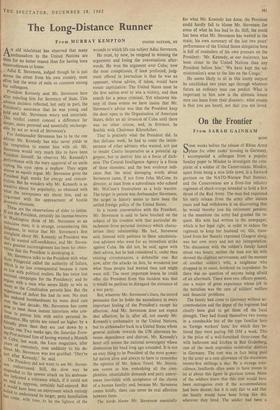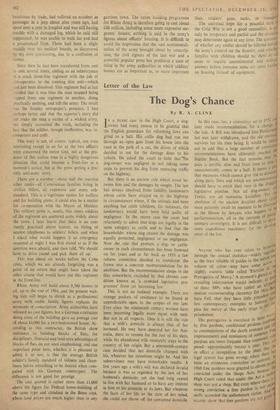On the Frontier
From SARAH GAINHAM
BONN
SOME weeks before the release of Rhine Army plans for other ranks' housing in Germany, I accompanied a colleague from a popular Sunday paper to Minden to investigate the com- plaint of a soldier of the Cameronians. Minden, apart from being a nice little town, is a forward garrison on the NATO-Warsaw Pact frontier, and the Cameronians are a front-line infantry regiment of shock-troops intended to hold a first thrust of the Red Army. The man had requested his early release from the army after sixteen years and had withdrawn it on discovering that he would thereby lose his retirement pension; in the meantime the army had granted the re- quest. His wife had written to the newspaper, which is her legit right, in order to induce the regiment to keep her husband on; this, trans- lated from her fluently expressed Glasgow slang, was her own story and not my interpretation. The discussion with the soldier's family lasted about two hours; neither the man nor his wife showed the slightest nervousness, and the manner of another soldier's wife, a neighbour who dropped in to assist, bordered on impudence. So there was no question of anyone being afraid of an aftermath. There were two officers present, one a major of great experience whose job in the battalion was the care of soldiers' welfare and financial problems.
The family had come to Germany without ac- commodation and the depot of the regiment had clearly been glad to get them off the local strength. They had found themselves two rooms in a ramshackle hut of the type familiar here as 'foreign workers' huts,' for which they be- lieved they were paying 100 DM a week. This is the price of a well-furnished three-room flat with bathroom and kitchen in Bad Godesberg, one of the most expensive residential districts in Germany. The rent was in fact being paid by the army as a rent allowance of the maximum twenty-five shillings a day. By a strange coin- cidence, landlords often seem to have rooms to let at about this figure in garrison towns. None of the soldiers knew that this rent would have been outrageous even if the accommodation had been decent; but it is only fair to add that the family would have been living like this wherever they lived. The soldier had been a bandsman by trade, had suffered an accident as passenger in a jeep about nine years ago, had spent over a year in hospital and was still having trouble with a damaged leg, which he said still suppurated; he was unable to walk far and had a pronounced limp. There had been a slight muddle over his medical boards, as discovered by my own questioning, due to a confusion of lames.
Since then he had been transferred from unit to unit several times, ending as an infantryman n a crack front-line regiment with the job of ;m-operator to the training film unit—which t.id just been dissolved. This regiment had at last 12cided that it was time the man stopped being -apped from one regiment to another, doing aractically nothing, and left the army. The result was the Sunday newspaper's presence. I had Nrhaps better add that the reporter's story did lot make the man a victim of a wicked army, but simply recounted the truth, including the fact that the soldier, though inoffensive, was in- competent and unfit.
This story is not, of course, typical, nor even interesting except in so far as the two officers were concerned the entire time, not at the pre- sence of this useless man in a highly dangerous situation that could become a front-line at a moment's notice, but at the press getting a pos- sibly anti-army story.
There are a number--about half the married other ranks--of Cameronian families living in civilian billets, all expensive and many sub- standard. This is a legitimate matter for welfare and for building plans; it could also be a matter for co-operation with the Mayor of Minden. The military point is, surely, that many soldiers of the regiment are scattered quite widely about the town. I later learnt that there is no con- stantly practised alarm system, no listing of nearest telephones to soldiers' billets, and when I asked what would happen if an emergency occurred at night I was first stared at as if the question were absurd, and then told, 'We should have to drive round and pick them all up.'
This was about six weeks before the Cuba crisis, which we are already forgetting was a point of no return that might have taken the other course that would have put this regiment in the front-line.
Rhine. Arms will build about 8,500 homes in all, up to the end of 1964, and the present wait- ing lists will begin to shrink as a professional army with stable family figures replaces the remnants of conscription. Army authorities have released no cost figures, but a German contractor doing some of the building gave an average cost of about £4,000 for a two-bedroomed house. Ac- cording to this contractor, the British show resistance to building blocks of flats; the disciplinary, financial and land-area advantages of blocks of flats do not need emphasising; and one important point here, whether it is pleasant to admit it or not, is that the average British soldier's family standard of tidiness and clean- liness leaves something to be desired when com- pared with his German counterpart. The difference is not good for prestige.
The cost quoted is rather more than £1,000 above the figure for Federal house-building of the same type and standard in the Bonn area, where land prices are much higher than in any garrison town. The entire building programme for Rhine Army is therefore going to cost about £40 million, including some more expensive ser- geants' houses; nothing is said in the army's figures about officers' housing. It is difficult to avoid the impression that the vast sentimentali- sation of the army brought about by conscrip- tion, the civil rigours of the last war and a powerful popular press has produced a state of mind in the army authorities in which soldiers' houses are as important as, or more important than, soldiers' guns, tanks, or transpo The universal hope for a peaceful turn the Cold War is not a good counsellor; it c, only be temporary and partial and the sit uatio may deteriorate again at any time. The questln of whether any soldier should be billeted outsid the army's control on the frontier, and wheth families with children should be there at a seem to require unsentimental and millta answers before immense sums are spent furthei on housing instead of equipment.































 Previous page
Previous page